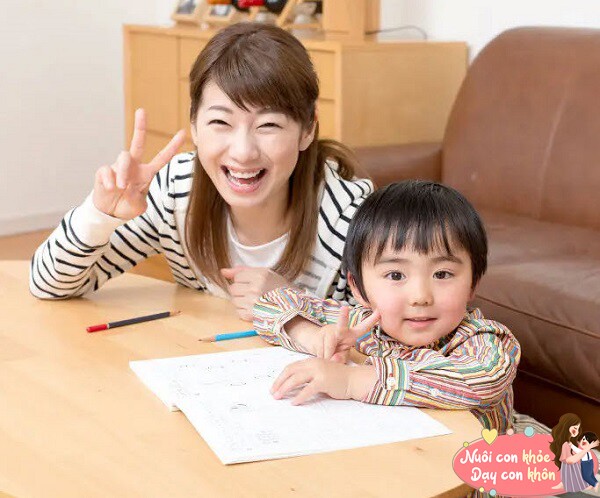How to foster a love of learning? Parents can do 4 things when their child is between the ages of 2 and 6, and later, they won’t have to worry too much about their child’s academic performance.

Combine learning with play
Many people think that children have to wait until they start primary school to begin learning. However, in reality, children are always learning from the moment they are born. They learn to walk, talk, observe people’s facial expressions, and play with different types of toys…
There is no fundamental difference between this form of learning and what children learn after primary school. They only differ in form:
For example, before the age of 6, children learn through play. After 6 years old, children gradually learn by reading and writing.
– When learning to control their bodies, children enjoy playing running and chasing games.

Combine learning with play.
– When they want to learn how to work with others, children play hide-and-seek with their friends.
– When they want to learn concepts such as shapes, colors, and structures, children play with Lego, puzzles, and jigsaw puzzles…
– When they want to explore natural sciences, children observe animals, pick up fallen leaves, and read picture books…
Children seem to be playing all day, but in reality, they are learning and exercising their minds tirelessly! If you want to cultivate diligence, you can encourage children to combine learning with play. Of course, encourage them to play with a variety of practical toys, water, sand, bubbles, nature…
One thing parents should note is to limit the use of electronic products such as mobile phones and tablets as they can easily cause a loss of focus.

Encourage their curiosity
The essence of a love for learning is curiosity about the unknown. Every child will go through a phase, usually around the age of 3 or 4, where they ask “why” a lot.
If parents take their children’s questions seriously, this “why” phase can continue into primary school.
The desire for knowledge and new information will make learning enjoyable. On the other hand, if parents show a perfunctory or impatient attitude towards their children’s questions, their curiosity and desire for understanding will diminish.

Encourage their curiosity.
Instead, children seek excitement and satisfaction from mobile games and short videos. By then, it’s too late for them to develop good study habits.
When your child is between 2 and 6 years old and asks questions, try to stop what you’re doing, look at them seriously, and say that it’s a great question and that even you haven’t thought of it. Then, use your knowledge to answer their question, or look up the information together.
Parents can also take this opportunity to choose some books with their children to satisfy their curiosity.
When parents take their questions seriously, children feel that asking questions is a good thing and will continue on a positive path of learning, which is “thinking – seeking answers – reading – understanding.”

Develop a habit of reading together early on
We all know that reading makes children smarter and more knowledgeable. However, to foster a love of reading, parents need to be the ones to guide them.
When children are young, the most precious thing is to have their parents by their side. These precious moments can occur during various activities, from sports, pet care, and cooking to reading. Especially when children see their parents passionate about reading, they will naturally want to join in.

Develop a habit of reading together early on.
The image of parents sitting beside their children, reading interesting stories together, will make them feel warmth and familiarity. It will also help develop their language skills, imagination, and concentration. Gradually, reading will become their favorite and most natural activity.
Frequently take your children to libraries and bookstores to choose books they like. Then, set a fixed time and place to read together every day.
Persistence is crucial in this process. When children start primary school and can read and write on their own, they will take the initiative to read without supervision.

Foster a calm attitude towards learning
It’s challenging to raise a child who loves learning, but it’s easy to destroy their passion. For example, when parents push their children too hard, set high expectations, or punish them for not achieving good results, they unintentionally create immense pressure on their children’s psychology. This pressure can make children anxious and lead to discouragement, causing them to lose interest in learning.

Foster a calm attitude towards learning.
Many parents today want their children to be able to recognize new words and be good at math from an early age, which is not wrong, but it needs to be approached carefully. Children are very sensitive, and if the focus is only on academic results without considering their emotions, they may easily rebel and develop a hatred for learning. When children feel that studying is only a duty, instead of an interesting and beneficial activity, they gradually distance themselves from books and knowledge.
Instead, if parents maintain a calm mindset, not getting too excited when their child does well or too disappointed when they don’t meet expectations, children will feel more comfortable in the learning process. Showing support and encouraging them to explore and discover new knowledge on their own helps build self-confidence and a lasting love for learning.
The Ancient’s Wisdom: 3 Keys to Raising Successful and Virtuous Children
As a parent, it is imperative to lead by example by first eliminating any bad habits. Do not underestimate the awareness of children, as the old adage goes, “start teaching your children good morals from a young age”. This is indeed the best time for parents to educate their children to become virtuous and respectful individuals.




































